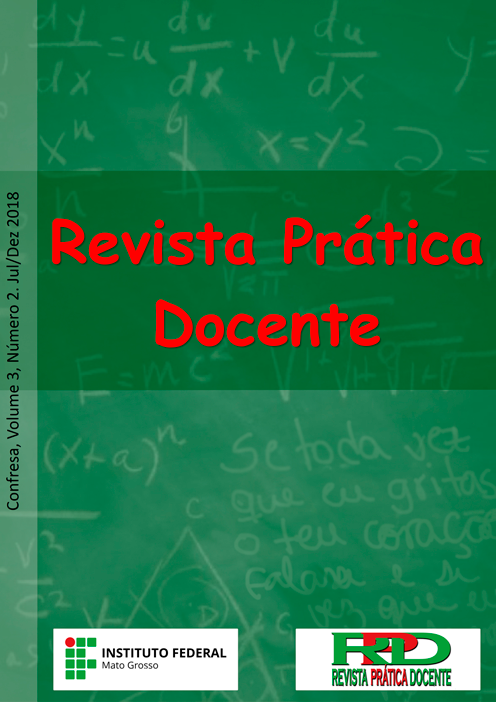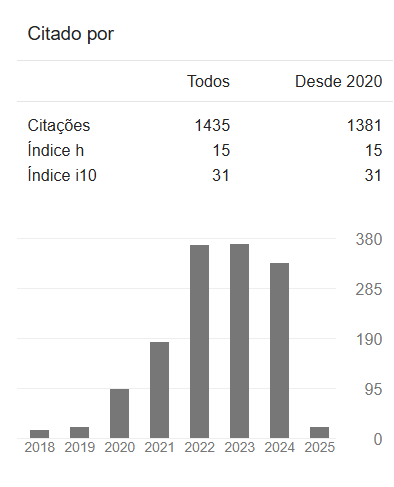TEST OF BASIC SCIENTIFIC LITERACY: REDUCTION AND VALIDATION PROCESS FOR THE PORTUGUESE TRANSLATION INSTRUMENT
DOI:
10.23926/RPD.2526-2149.2018.v3.n2.p575-594.id251Keywords:
Scientific Literacy, Science Education, ReliabilityAbstract
This study aimed to present the process of reducing instrumental Test of Basic Scientific Literacy (TBSL) of Laugksch and Spargo (1996). This instrument, with reference in national and international literature, consists in 110 questions relating concepts and scientific phenomena, the nature of science and impacts of science and technology on society and on the environment. The questionnaire size can derail the application on school context, because it requires large time to answer it, and also there is a risk of compromising the participant’s commitment about the marked answers. A possible solution is to reduce it to a smaller number of items, by using statistical techniques, so that the validity, reliability and power of measurement wouldn’t be harmed. Then, an application of the TBSL was held in the first half of 2018 in 141 individuals, graduates from high school, entering a Federal Institute of the city of Pelotas/RS. As a result, it got a reduction to 45 items, keeping similar validation indexes of the original instrument. It is expected that this instrument can contribute with teachers and researchers, assisting them to present diagnostics about the Scientific Literacy in Brazilian context.
Downloads
Metrics
References
ANDRADE, Ê. R.; SCHEUER, C. Análise da eficácia do metilfenidato usando a versão abreviada do questionário de conners em transtorno de déficit de atenção/hiperatividade. Arquivos de Neuro-Psiquiatria, São Paulo, v. 62, n. 1, p. 81-85, Mar. 2004. DOI: https://doi.org/10.1590/S0004-282X2004000100014
AULER, D.; DELIZOICOV, D. Alfabetização científico-tecnológica para quê?. Ensaio Pesquisa em Educação em Ciências (Belo Horizonte), v. 3, n. 2, p. 122-134, 2001. DOI: https://doi.org/10.1590/1983-21172001030203
BARAM‐TSABARI, A.; YARDEN, A. Text genre as a factor in the formation of scientific literacy. Journal of research in science teaching, v. 42, n. 4, p. 403-428, 2005. DOI: https://doi.org/10.1002/tea.20063
BITTAR, D. B.; PEREIRA, L. V.; LEMOS, R. C. A. Sistematização da assistência de enfermagem ao paciente crítico: proposta de instrumento de coleta de dados. Texto Contexto Enfermagem, v. 15, n. 4, p. 617-628, 2006. DOI: https://doi.org/10.1590/S0104-07072006000400010
BROSSARD, D.; SHANAHAN, J. Do they know what they read? Building a scientific literacy measurement instrument based on science media coverage. Science Communication, v. 28, n. 1, p. 47-63, 2006. DOI: https://doi.org/10.1177/1075547006291345
CAMARGO, A. N. B.; PILAR, F. D.; RIBEIRO, M. E. M.; FANTINEL, M.; RAMOS, M. G. Alfabetização Científica: A evolução ao Longo da formação de Licenciandos Ingressantes, Concluintes e de Professores de Química. Momento – Diálogos em Educação, v.20, n.2, p. 19-29, 2011.
CAMARGO, B. V.; BARBARÁ, A.; BERTOLDO, R. B. Um instrumento de medida da dimensão informativa da representação social da aids. Jornada Internacional, v. 4, p. 1385-1395, 2005.
CARVALHO, A.M.P. E TINOCO, S.C. O Ensino de Ciências como 'enculturação'. In: Catani, D.B. e Vicentini, P.P., (Orgs.). Formação e autoformação: saberes e práticas nas experiências dos professores. São Paulo: Escrituras, 2006.
CHASSOT, A. Alfabetização científica: uma possibilidade para a inclusão social. Revista
Brasileira de Educação, n. 22, p. 89-100, 2003;
CHASSOT, A. Alfabetização Científica – Questões e desafios para a educação. Ijuí, Editora da Unijuí, ed. 1, 2011.
CHIN, C. First‐year Pre‐service Teachers in Taiwan—Do they enter the teacher program with satisfactory scientific literacy and attitudes toward science? International Journal of Science Education, v. 27, n. 13, p. 1549-1570, 2005. DOI: https://doi.org/10.1080/09585190500186401
CUNHA, R. B. Alfabetização científica ou letramento científico?: interesses envolvidos nas interpretações da noção de scientific literacy. Revista Brasileira de Educação, Rio de Janeiro, v. 22, n. 68, p. 169-186, 2017. DOI: https://doi.org/10.1590/s1413-24782017226809
FIGUEIREDO, V. L. M.; MATOS, V. L. D.; PASQUALI, L.; FREIRE, A. P. Propriedades psicométricas dos itens do teste WISC-III. Psicologia em estudo. v.13, n.3, p. 585-592. 2008. DOI: https://doi.org/10.1590/S1413-73722008000300020
FRANCA, C.; COLARES, V. Validação do National College Health Risk Behavior Survey para utilização com universitários brasileiros. Ciência e Saúde Coletiva, v. 15, p. 1209-1215, 2010. DOI: https://doi.org/10.1590/S1413-81232010000700030
HAIR, J.; BLACK, W.; BABIN, B.; ANDERSON, R.; TATHAM, R. Multivariate Data Analysis. 6ª ed. Upper Saddle River, NJ: Pearson Prentice Hall, 2006.
LAUGKSCH, R. C.; SPARGO, P. E. Construction of a paper-and-pencil Test of Basic
Scientific Literacy based on selected literacy goals recommended by the American
Association for the Advancement of Science. Public Understanding of Science, v. 5, p.
-359, 1996.
LAUGKSCH, R. C.; SPARGO, P. E. Scientific Literacy of Selected South African Matriculants Entering Tertiary Education: A Baseline Survey. South African journal of science, v. 95, p. 427-432, 1999.
LIMA, M. S.; WEBER, K. C. Reflexões acerca das definições e mensuração de níveis de letramento científico. Anais do Congresso Nacional de Educação – CONEDU. 2017. Disponível em:< https://editorarealize.com.br/revistas/conedu/trabalhos/ TRABALHO_EV056_MD1_SA18_ID3162_11082016105336.pdf>. Acesso: Jun. 2018.
MAMEDE, M.; ZIMMERMANN, E. Letramento científico e CTS na formação de professores para o ensino de ciências. Enseñanza de las Ciencias, n. Extra, p. 1-4, 2005.
MILLER, J. Scientific literacy: a conceptual and empirical review. Daedalus, v. 112, n.
, p. 29-48, 1983. DOI: https://doi.org/10.1017/S0028688500011103
MOREIRA, M. A.; ROSA, P. R. S. Uma introdução à pesquisa quantitativa em Ensino. Porto Alegre: Edição dos Autores, 2007.
MORTIMER, E.F. E MACHADO, A.H. A Linguagem em uma Aula de Ciências, Presença Pedagógica, v.2, n.11, 49-57, 1996.
MURCIA, K.; SCHIBECI, R. Primary student teachers' conceptions of the nature of science. International journal of science education, v. 21, n. 11, p. 1123-1140, 1999. DOI: https://doi.org/10.1080/095006999290101
NASCIMENTO-SCHULZE, C. M. Um estudo sobre alfabetização científica com jovens catarinenses. Psicologia: teoria e prática, v. 8, n. 1, 2006.
ÖZDEM, Y. Y.; ÇAVAŞ, P.; CAVAS, B.; ÇAKIROǦLU, J; ERTEPINAR, H. An investigation of elementary students' scientific literacy levels. Journal of Baltic Science Education. V.9 n. 1, p. 6-19, 2010.
PASQUALI, L. Psicometria: teoria dos testes na psicologia e na educação. Petrópolis: Editora Vozes, 2017.
RIVAS, M. I. E. Avaliação do nível de Alfabetização Científica de estudantes de biologia. Trabalho de conclusão de curso. Graduação em biologia. Universidade Federal do Rio Grande do Sul – UFRGS, 2015;
SASSERON, L. H.; CARVALHO, A. M. P. Almejando a alfabetização científica no ensino fundamental: a proposição e a procura de indicadores do processo. Investigações em ensino de ciências, v. 13, n. 3, p. 333-352, 2008.
SASSERON, L. H.; CARVALHO, A. M. P. Alfabetização Científica: uma revisão bibliográfica. Investigações em Ensino de Ciências, v.16, n.1, p. 59-77, 2011.
SOUZA, A. C.; ALEXANDRE, N. M. C.; GUIRARDELLO, E. B. Propriedades psicométricas na avaliação de instrumentos: avaliação da confiabilidade e da validade. Epidemiologia e Serviços de Saúde, v. 26, p. 649-659, 2017. DOI: https://doi.org/10.5123/S1679-49742017000300022
SOUZA, C. A.; BASTOS, F. P.; ANGOTTI, J. A. P. Cultura científico-tecnológica na educação básica. Ensaio Pesquisa em Educação em Ciências (Belo Horizonte), v. 9, n. 1, p. 76-88, 2007. DOI: https://doi.org/10.1590/1983-21172007090106
VIDOR, C. B.; COSTA, S. S. C. ; SILVA, A. M. M.; RAMOS, M. G. Avaliação do nível de
Alfabetização Científica de professores da educação básica. In: VII Encontro Nacional de Pesquisadores em Ensino de Ciências, 2009. Anais do VI ENPEC. Florianópolis: ABRAPEC, 2009. Disponível em: http://www.foco.fae.ufmg.br/viienpec/index.php/enpec/viienpec/paper/view/1047. Acesso em: jun. 2018.
Downloads
Published
How to Cite
Issue
Section
License
Copyright (c) 2023 A Revista Prática Docente tem o direito de primeira publicação

This work is licensed under a Creative Commons Attribution-NonCommercial 4.0 International License.
Authors who publish in this journal agree to the following terms:
- Authors retain the copyright and grant the journal the right of first publication, with the paper simultaneously licensed under the Licença Creative Commons Attribution allows the sharing of the work with acknowledgment of authorship and initial publication in this journal.
- Authors are authorized to take additional contracts separately, for non-exclusive distribution of the version of the work published in this journal (e.g. publish in institutional repository or as a book chapter), with acknowledgment of authorship and initial publication in this journal.











